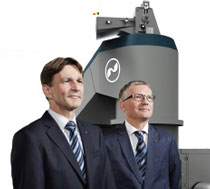Plastic recycling as a key function for a sustainable life
Also, download this story from the electronic issue here
Plastic has become indispensable in everyday life. It is an essential feature of our modern lifestyles and can be found in all parts of it. Product innovations, the development of alternative energy carriers and, above all, the rising global population mean that the demand for plastic as a raw material will continue to increase. At the same time, however, the supply of fossil raw materials is rapidly decreasing. Asked about how this situation will continue to develop until the year 2030, the two Erema CEOs Klaus Feichtinger and Manfred Hackl speak with one voice: the key lies in the efficient utilisation of existing plastic streams and the key function is in the recycling of plastics. A closed loop with high amounts of recycled material in products would also help plastic gain a positive image in society.

How would you describe the current significance of plastics?
Manfred Hackl: They are of unbelievable significance. When you consider that, unlike other materials such as paper, metal or glass, plastic is only 60 years old, it is remarkable that it is used just about everywhere and has become indispensable. The reason for this is that compared to other materials, plastics have an incredible, broad portfolio of characteristics – plus the price performance ratio is convincing. This is what makes a life without plastics unimaginable.
Klaus Feichtinger: You only have to look at everyday life. In order to maintain our lifestyles, food has to be kept as fresh as possible for as long as possible and that would be impossible without plastic packaging. Seen in global terms there would not even be other energy sources such as wind turbines and solar panels as these did not become economically viable until plastic was used.
How will the significance of plastic continue to grow up to the year 2030?
Manfred Hackl: Even greater importance will be attached to plastics in future. The benefits of this multifunctional material in terms of technology and design will drive forward innovations in many product sectors, such as lightweight automotive construction, for example, to reduce fuel and CO2 consumption.
Plastic consumption is currently growing at a rate of 8% every year worldwide, with around 7.2 billion people living on the planet earth. Forecasts estimate that global population will be in the region of 8.4 billion in the year 2030, which means the demand for plastics will grow enormously.
The growth in population, however, will not be distributed evenly across all continents. While Europe's contribution to the global population will shrink from 18% to 8%, other regions of the planet will grow rapidly and disproportionately – and with them also the demand for raw materials. As, however, Europe has relatively low fossil energy resources, the shortage in these areas will exacerbate and lead to an increase in prices. This means that in future we will have to drastically reduce our dependence on fossil raw materials such as crude oil or natural gas and we will have to do so in two ways. First we will have to succeed in closing the loop of existing plastic streams by means of recycling. And secondly, because transport, heating and energy still currently account for 87% of crude oil consumption, we have to make more intensive use of the material benefits of plastics to obtain renewable energy and for lightweight engineering.
Klaus Feichtinger: The goal, therefore, is as far as possible autonomous supply through closed recycling loops and renewable energy generation. Reliable, inexpensive and environmentally sound energy supply is a crucial factor in the sustainable development of modern societies. Material-driven innovations are of vital importance in further growth and the penetration of the market of energy technologies. As polymer materials offer special potential here, they will become a driving force and thus be key materials in future developments.
What does this mean then for the plastics recycling industry?
Manfred Hackl: Enormous potential, of course, because plastics are becoming increasingly valuable as a secondary raw material – not only in terms of quantity but also with regard to quality. But to turn waste plastic into high-quality and recognised secondary raw material calls for intensive communication within the entire plastics industry – between raw material suppliers, plastics processors and recyclers.
This is the basis for proper eco-design. Only then is it possible to develop new products which take into account their later recyclability at the time they are produced. The way forward is to organise material flows better and optimise the production of plastics in such a way that new, high-quality products with a high recycling content can be achieved. This is how sustainability works in a closed loop.
Why does this closed loop not work now and what is your vision for its realisation?
Klaus Feichtinger: In order to secure the necessary material streams also for future generations the portion of recycled material in products has to increase dramatically. In terms of technology this is indeed already possible, but the industry still has to accept the fact. The crux of the matter lies namely in a completely paradoxical view of the general public and the industry.
Whereas plastic is regarded as a valuable raw material by the industry it often has a negative aftertaste for the general public. On the other hand, people see recycling as a positive topic, whereas the majority of the industry still refuses to use recycled pellets – although everyone talks about sustainable corporate policy. If business and society do not change their approach themselves regarding this issue, legislation will have to intervene.
Manfred Hackl: Passing laws for the collection of plastic waste for reuse is not enough; you have to stipulate defined minimum percentages of recyclates in plastic products. A higher portion of recycled material in plastic products would not only have enormous positive leverage on the entire plastics industry, it would also be a huge opportunity in terms of image. But the longer this development takes, the more difficult it will be to maintain our material flows in a sustainable way.
Who else could help to realise this vision?
Klaus Feichtinger: To press ahead with this development, even more global branded companies need to recognise the benefits we can gain by initiating a positive spiral and offering products which contain recycled materials. Ikea was one of the first companies to recognise this, Coca- Cola also makes a major contribution with rPET featuring in bottles and Henkel was recently added to the list with another product containing recycled material. Far more global players, however, would have to pull together.
Manfred Hackl: These can also be smaller, regional initiatives which, as a good and successful example with a large portion of creativity, lead the way to increasing the portion of recycled material. In Chile, for example, three young masterminds launched the initiative "Net Positiva" to free the sea from old polyamide fishing nets. Thanks to an incredibly creative idea a company was formed, which now manufactures trendy skateboards from the recycled pellets from these nets.
Klaus Feichtinger: Articles in the media could likewise make such a valuable contribution. Discussions which are not always factual and balanced, like the current debate about microplastics, bisphenol A and plastic carrier bags, tend to overshadow the positive aspects of the material in the public's eye.
Where do you see the biggest growth markets in plastics recycling?
Klaus Feichtinger: If you take a look at current legislation developments in Europe, Brazil and China – just think of the 'Green Fence' – which speed up the development and efficiency of collection systems, we expect recycling to become stronger in the post-consumer area and in the case of regrind from the automotive and electronic sectors.
Manfred Hackl: In the field of plastic recycling systems, efficient and flexible systems in particular will prevail because the complexity in the processing of used plastics will continue to increase due to constant innovations in the production of plastics. Extensive recycling competence and experience together with a high degree of innovation are without doubt the key factors for success. Erema has been taking this approach for 30 years now and is, therefore, well prepared to provide the answers to these and also other, new recycling challenges.
(PRA)Copyright (c) 2015 www.plasticsandrubberasia.com. All rights reserved.









































